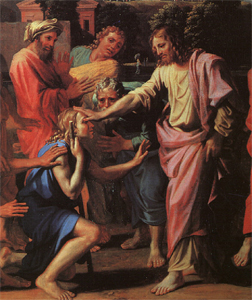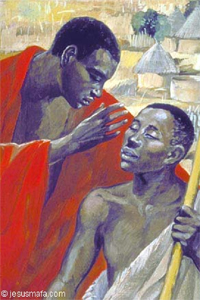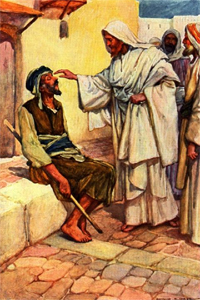
Christmas
Easter
Pentcoest
All Saints
Christ The King
Confirmation
Palm/Passion
Reformation
Stewardship
Books of the Bible
Lenten Series
Christmas Dramas
Videos
Series A - Matthew
Series B - Mark
Series C - Luke
Series D - Other
To contact
Edward F. Markquart
info@sfs.com

Series B Mark 10:46-52The following Bible study is from a larger course entitled, THE LIFE OF CHRIST: A Study in the Four Gospels. This 54 week course for the laity will be available for congregations in 2006. Basic text for the course: SYNOPSIS OF THE FOUR GOSPELS, Kurt Aland, English Edition, P. 227. Introductory Comments Blindness was a very common disease in Jesus’ day and could be readily seen in every marketplace. In today’s modern world, the factors that create physical blindness are not as prevalent as in ancient Biblical times. In today’s world, we do not see as many blind people as we would have in the first century or in Third World countries today. In Biblical times, blindness was primarily caused by a water duct, located beneath the eyelids, drying up. The water duct under the eyelids became dry and the eyelids became puffy and swollen, as did the eyeballs themselves. This kind of blindness was spread by flies and was aggravated by the hot desert sun and desert sands. It was a highly contagious disease and the only way to contain it was to quarantine the people who had this dreaded blindness. Blindness now has a technical scientific name for this disease: "Ophthalmic conjunctivitis." We find this kind of blindness nowadays in Third World countries, where there are swollen red eyelids and swollen eyeballs. The point is: blindness was very common in Biblical times. Blindness was found among one’s family and friends. The Jewish people of that era believed that when the Messiah came, the Messiah would heal blindness. The prophet Isaiah said that the Messiah would heal many diseases e.g. the deaf would hear, the lame would walk, the lepers would be cleansed, and the blind would see again. We recall Matthew 11:5 and Luke 7:22, when John the Baptist was trying to discover if Jesus was really the promised Messiah or not. Jesus replied to the questions from John the Baptist. “Go and tell John (the Baptist) what you have seen and heard: the blind receive their sight, the lame walk, the lepers are cleansed, the deaf hear, the dead are raised, the poor have good news brought to them.” Yes, Jesus said that he was the promised Messiah, who was also known as the Son of David. We recall the Messianic prophecy in Isaiah 35:5, 6a, “Then the eyes of the blind shall be opened, and the ears of the deaf unstopped; then the lame shall leap like a deer, and the tongue of the speechless sing for joy.” Also Isaiah 29:18, “On that day the deaf shall hear the words of a scroll, and out of their gloom and darkness the eyes of the blind shall see.” There are three situations in the gospels where Jesus healed blindness. First, early in his ministry, Jesus healed two blind people and these were signs that the Messianic prophecies in the Old Testament had come true. Then, later in the temple in Jerusalem, Jesus healed the man born blind and taught that he (Jesus) was the light of the world. Then, just before Passion Week, Jesus healed blind Bartimaeus in Jericho and that story symbolized how Jesus healed both physical and spiritual blindness. Jesus healed these people of their blindness and these healings were signs that the Messiah and Messianic age had finally arrived. In Mark’s gospel for this coming Sunday, the story of blind Bartimaeus is immediately preceded by the story of James and John who asked Jesus to chose the two of them to be seated at his right hand and left hand in glory. Jesus asked both James and John the IDENTICAL question he asked blind Bartimaeus: “What do you want me to do for you?” James and John were spiritually blind; and when their story was over, they were still spiritually blind. Bartemaeus was physically blind; but when his story was over, Bartimaeus could see. There is significant connection between spiritual blindness and physical blindness. #264. The Healing Of The Blind Men (Bartimaeus) Matthew 20:29-34, Mark 10:46-52, Luke 18:35-43 It seems appropriate to compare the three gospel parallels of this story of Jesus healing a blind man in Matthew 20, Mark 10, and Luke 18. All three stories have a similar geographic location in Jericho. All three stories are parallel in the time frame of Jesus’ life. That is, the healing of the blind man occurs just before the anointing of Jesus for burial at Bethany and his grand entrance into Jerusalem for the Palm Sunday Parade. We prefer Mark’s account (over Matthew’s) of this event in Jericho just before Jesus entered Jerusalem and the triumphal entry. The storyteller is our eye-witness, Simon Peter, and he again gives us good graphic details of the event, graphic details which are lacking in Matthew’s account. (Matthew’s version of the story has two men, not one.) Mark earlier told of another incident where Jesus healed a blind man from Bethsaida (near Capernaum) at the north end of the Sea of Galilee (Mark 8:22-26). This healing of the blind man from Bethsaida could supplement the gospel text for Pentecost 21B. The healing miracle from Mark 8:22-26 is not part of the Sunday morning lectionary but that miracle story really doesn’t add much to the gospel lesson for this coming Sunday. The story of blind Bartimaeus is more visual and graphic. It is also directly connected with the spiritual blindness of James and John. -And they came to Jericho. Finally, we have arrived in Jericho and are now close to Jerusalem. We remember the location of Jericho in our mental map of that region of the world. We can easily imagine Jesus traveling from the Sea of Galilee, walking south on the banks of the Jordan River, following the fault line of the Rift Valley, to Jericho which has the lowest elevation of any city on Earth. (The elevation of Jericho is about 750 feet below sea level.) http://www.christiananswers.net/eden/jericho-israel-map.jpg
http://www.keyway.ca/gif/jericho2.gif
-As he was leaving Jericho with his disciples and a great multitude of people, By now Jesus had become VERY popular and a crescendo of chaos was building around him. It was not just Jesus’ disciples who are on the scene. Literally, thousands of folks were traveling along with him as he was coming to the end of his journey to Jerusalem. -Bartimaeus, a blind beggar, the son of Timaeus, was sitting by the roadside. Notice the detail in Mark’s account of the story. We hear the personal name of the blind beggar and also the name of his father. This story does not feel like an author trying to create an illusion of historical plausibility, but this story feels like an actual historical memory. The name, “Bartimaeus,” means “son of Timaeus.” -When he heard that it was Jesus of Nazareth, he began to cry out, “Jesus, Son of David, have mercy on me.” The beggar began to make a nuisance of himself, crying out for the help and attention of Jesus. "Have mercy on me" is the basic prayer found on the lips of all human beings. As human beings, we are constantly asking the Lord God for benevolence, mercy and kindness towards us and our situation. -Many rebuked him, telling him to be silent, but he cried out all the more, “Son of David, have mercy on me.” The crowd told him to “shut up and be silent” but Blind Bartimaeus cried out all the more to Jesus. Blind Bart knew what he wanted and needed from Jesus of Nazareth: MERCY. Yes, we all do. -Jesus stopped and said, “Call him.” Bartimaeus got what he wanted. Jesus stopped and called him. Why did Jesus stop in front of him? Because he was making such a nuisance of himself that Jesus wanted to shut the guy up? I think not. There were reasons for Jesus stopping in front of Bartimaeus. Let’s proceed. -They called the blind man, saying to him, “Take heart. Rise. He is calling you.” Underline this phrase, “Take heart. Rise. Jesus is calling you.” This is what we want in life. We want Jesus to stop in front of our little lives. We want Jesus to notice us in this big world of ours. We want Jesus to say to us, “Take heart. Get up. I am calling you.” Yes, that is what we all want, those of us who love God and want God to come to us and help us when we are discouraged and down in the dumps, like blind Bartimaeus must have been. That is why Jesus said those precious words to him, “Take heart.” Jesus knew Bartimaeus was “down.” When we are “down and out” and life is all messed up and we are in the bottom of our ruts, we want to hear the voice of Jesus directed to us, “Take heart. Get up. I am calling you.” We want to hear the voice of God and experience the help from God in our painful situations. These words, "Take heart. Rise. God/Jesus is calling you," are the Word of the Lord and the heart of the gospel. There may be some people in our congregations who are physically blind. This episode with Bartimaeus could be told in such a way that gives a false interpretation to the physically blind. It could be implied, “If they REALLY believe and shouted at God the way blind Bartimaeus did, they, too, would be physically healed.” A preacher needs to be sensitive in the way he/she crafts words so that physically blind people are not made to feel guilty that they don’t have enough faith to be healed. To ALL of us, Jesus’ words are a sign of hope: “Take heart. Rise. I am calling you.” -Throwing off his mantle, he sprang up and came to Jesus. Again, notice the detail that is given by the author, Simon Peter, via Mark. “Bart” threw off his coat and jumped up. We can feel “Bart’s” vigor as he jumped up and came to Jesus. This is definitely an eye-witness account. A reader can feel the action in Bart’s legs and spirit, first in his spirit and then in his legs. -Jesus said to him, “What do you want me to do for you?” This is the big question that Jesus asks of us as well. “What do we want Jesus to do for us? What do you want Jesus to do for you?” This question was the identical question that Jesus asked of James and John when they told Jesus that they wanted to sit at Jesus’ right hand in glory. Foolishly, James and John wanted glory and power. Bart simply wanted to see and knew that the miracle of sight would be given to him through Jesus.
-The blind man said to him, “Master, let me receive my sight.” This is what the blind man wanted more than anything else. To see. -Jesus, in pity, touched their eyes. (Matthew only) We love it that Jesus had pity on this blind man, and we love it when Jesus/God has pity on our loved ones when they are living with some disability. We recall that in Matthew’s account, there were two blind men who were healed which accounts for the plural “their eyes,” rather than “his eyes.” -Jesus said to him, “Go your way, your faith has made you well.” This is a wonderful sample of a healing miracle like we studied earlier in this course. We remember that this particular miracle is an example of “faith healing.” We recall that the story of Jesus healing “the blind beggar from birth” in the temple (Gospel of John) was not an example of faith healing. That blind beggar in the temple didn’t even know who Jesus was. -And immediately he received his sight Like in so many miracles and other events in Jesus life, blind Bart was IMMEDIATELY healed. Briefly examine the way that the Gospel of Mark uses the word, “immediately,” which is favorite word for him. The word “immediately” is used 22 times in the Bible verses below.
-and followed him on the way. This is a simple but powerful phrase. Bart, not blind Bart, followed Jesus on the way, the way to life, the way to Jerusalem, the way to the cross. A reader feels that Bart was healed physically and healed spiritually. Because he was healed spiritually, he was open to God’s future for him. We recall that the earliest Christians were called “followers of the way.” -And (the blind man) glorified God and all the people, when they saw it, gave praise to God. (Luke only.) This blind man glorified and praised God, just the as the one leper who was healed praised God and just as the man with the legion of demons praised God after he was healed. The story of blind Bartimaeus ends a large section of Jesus’ life. There are three basic epochs in Jesus’ adult life: 1) Galilee, 2) the journey to Jerusalem, 3) Jerusalem. The “blind Bartimaeus” story is the last story in Jesus’ journey to Jerusalem. Jesus is now ready to enter town and face his future. http://cgfa.dotsrc.org/poussin/p-poussi15.htm
http://www.jesusmafa.com/anglais/imag29.htm
http://www.drsmdavis.com/content/Jes_heals_man.jpg
|
|




